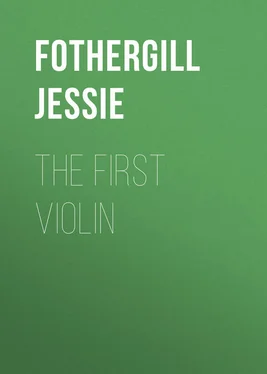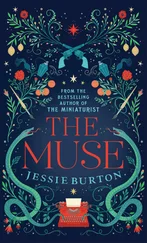Jessie Fothergill - The First Violin
Здесь есть возможность читать онлайн «Jessie Fothergill - The First Violin» — ознакомительный отрывок электронной книги совершенно бесплатно, а после прочтения отрывка купить полную версию. В некоторых случаях можно слушать аудио, скачать через торрент в формате fb2 и присутствует краткое содержание. Жанр: foreign_antique, foreign_prose, foreign_sf, на английском языке. Описание произведения, (предисловие) а так же отзывы посетителей доступны на портале библиотеки ЛибКат.
- Название:The First Violin
- Автор:
- Жанр:
- Год:неизвестен
- ISBN:нет данных
- Рейтинг книги:4 / 5. Голосов: 1
-
Избранное:Добавить в избранное
- Отзывы:
-
Ваша оценка:
- 80
- 1
- 2
- 3
- 4
- 5
The First Violin: краткое содержание, описание и аннотация
Предлагаем к чтению аннотацию, описание, краткое содержание или предисловие (зависит от того, что написал сам автор книги «The First Violin»). Если вы не нашли необходимую информацию о книге — напишите в комментариях, мы постараемся отыскать её.
The First Violin — читать онлайн ознакомительный отрывок
Ниже представлен текст книги, разбитый по страницам. Система сохранения места последней прочитанной страницы, позволяет с удобством читать онлайн бесплатно книгу «The First Violin», без необходимости каждый раз заново искать на чём Вы остановились. Поставьте закладку, и сможете в любой момент перейти на страницу, на которой закончили чтение.
Интервал:
Закладка:
I went upstairs again, and found that Miss Hallam proposed, during the forenoon, to go and find the Eye Hospital, where she was to see the oculist, and arrange for him to visit her, and shortly after eleven we set out.
The street that I had so dimly seen the night before, showed itself by daylight to be a fair, broad way. Down the middle, after the pleasant fashion of continental towns, was a broad walk, planted with two double rows of lindens, and on either side this lindenallee was the carriage road, private houses, shops, exhibitions, boarding-houses. In the middle, exactly opposite our dwelling, was the New Theater, just drawing to the close of its first season. I looked at it without thinking much about it. I had never been in a theater in my life, and the name was but a name to me.
Turning off from the pretty allee, and from the green Hofgarten which bounded it at one end, we entered a narrow, ill-paved street, the aspect of whose gutters and inhabitants alike excited my liveliest disgust. In this street was the Eye Hospital, as was presently testified to us by a board bearing the inscription, “Städtische Augenklinik.”
We were taken to a dimly lighted room in which many people were waiting, some with bandages over their eyes, others with all kinds of extraordinary spectacles on, which made them look like phantoms out of a bad dream – nearly all more or less blind, and the effect was surprisingly depressing.
Presently Miss Hallam and Merrick were admitted to an inner room, and I was left to await their return. My eye strayed over the different faces, and I felt a sensation of relief when I saw some one come in without either bandage or spectacles. The new-comer was a young man of middle height, and of proportions slight without being thin. There was nothing the matter with his eyes, unless perhaps a slight short-sightedness; he had, I thought, one of the gentlest, most attractive faces I had ever seen; boyishly open and innocent at the first glance; at the second, indued with a certain reticent calm and intellectual radiance which took away from the first youthfulness of his appearance. Soft, yet luminous brown eyes, loose brown hair hanging round his face, a certain manner which for me at least had a charm, were the characteristics of this young man. He carried a violin-case, removed his hat as he came in, and being seen by one of the young men who sat at desks, took names down, and attended to people in general, was called by him:
“Herr Helfen – Herr Friedhelm Helfen!”
“ Ja – hier! ” he answered, going up to the desk, upon which there ensued a lively conversation, though carried on in a low tone, after which the young man at the desk presented a white card to “Herr Friedhelm Helfen,” and the latter, with a pleasant “Adieu,” went out of the room again.
Miss Hallam and Merrick presently returned from the consulting-room, and we went out of the dark room into the street, which was filled with spring sunshine and warmth; a contrast something like that between Miss Hallam’s life and my own, I have thought since. Far before us, hurrying on, I saw the young man with the violin-case; he turned off by the theater, and went in at a side door.
An hour’s wandering in the Hofgarten – my first view of the Rhine – a dull, flat stream it looked, too. I have seen it since then in mightier flow. Then we came home, and it was decided that we should dine together with the rest of the company at one o’clock.
A bell rang at a few minutes past one. We went down-stairs, into the room in which I had already breakfasted, which, in general, was known as the saal. As I entered with Miss Hallam I was conscious that a knot of lads or young men stood aside to let us pass, and then giggled and scuffled behind the door before following us into the saal.
Two or three ladies were already seated, and an exceedingly stout lady ladled out soup at a side table, while Clara and a servant-woman carried the plates round to the different places. The stout lady turned as she saw us, and greeted us. She was Frau Steinmann, our hostess. She waited until the youths before spoken of had come in, and with a great deal of noise had seated themselves, when she began, aided by the soup-ladle, to introduce us all to each other.
We, it seemed, were to have the honor and privilege of being the only English ladies of the company. We were introduced to one or two others, and I was assigned a place by a lady introduced as Fräulein Anna Sartorius, a brunette, rather stout, with large dark eyes which looked at me in a way I did not like, a head of curly black hair cropped short, an odd, brusque manner, and a something peculiar, or, as she said, selten in her dress. This young lady sustained the introduction with self-possession and calm. It was otherwise with the young gentlemen, who appeared decidedly mixed. There were some half dozen of them in all – a couple of English, the rest German, Dutch, and Swedish. I had never been in company with so many nationalities before, and was impressed with my situation – needlessly so.
All these young gentlemen made bows which were, in their respective ways, triumphs of awkwardness, with the exception of one of our compatriots, who appeared to believe that himself and his manners were formed to charm and subdue the opposite sex. We then sat down, and Fräulein Sartorius immediately opened a conversation with me.
“ Sprechen Sie Deutsch, Fräulein? ” was her first venture, and having received my admission that I did not speak a word of it, she continued, in good English:
“Now I can talk to you without offending you. It is so dreadful when English people who don’t know German persist in thinking that they do. There was an English-woman here who always said wer when she meant where, and wo when she meant who. She said the sounds confused her.”
The boys giggled at this, but the joke was lost upon me.
“What is your name?” she continued; “I didn’t catch what Frau Steinmann said.”
“May Wedderburn,” I replied, angry with myself for blushing so excessively as I saw that all the boys held their spoons suspended, listening for my answer.
“May — das heisst Mai ,” said she, turning to the assembled youths, who testified that they were aware of it, and the Dutch boy, Brinks, inquired, gutturally:
“You haf one zong in your language what calls itself, ‘Not always Mai,’ haf you not?”
“Yes,” said I, and all the boys began to giggle as if something clever had been said. Taken all in all, what tortures have I not suffered from those dreadful boys. Shy when they ought to have been bold, and bold where a modest retiringness would better have become them. Giggling inanely at everything and nothing. Noisy and vociferous among themselves or with inferiors; shy, awkward and blushing with ladies or in refined society – distressing my feeble efforts to talk to them by their silly explosions of laughter when one of them was addressed. They formed the bane of my life for some time.
“Will you let me paint you?” said Fräulein Sartorius, whose big eyes had been surveying me in a manner that made me nervous.
“Paint me?”
“Your likeness, I mean. You are very pretty, and we never see that color of hair here.”
“Are you a painter?”
“No, I’m only a Studentin yet; but I paint from models. Well, will you sit to me?”
“Oh, I don’t know. If I have time, perhaps.”
“What will you do to make you not have time?”
I did not feel disposed to gratify her curiosity, and said I did not know yet what I should do.
For a short time she asked no more questions, then
“Do you like town or country best?”
“I don’t know. I have never lived in a town.”
“Do you like amusements – concerts, and theater, and opera?”
Читать дальшеИнтервал:
Закладка:
Похожие книги на «The First Violin»
Представляем Вашему вниманию похожие книги на «The First Violin» списком для выбора. Мы отобрали схожую по названию и смыслу литературу в надежде предоставить читателям больше вариантов отыскать новые, интересные, ещё непрочитанные произведения.
Обсуждение, отзывы о книге «The First Violin» и просто собственные мнения читателей. Оставьте ваши комментарии, напишите, что Вы думаете о произведении, его смысле или главных героях. Укажите что конкретно понравилось, а что нет, и почему Вы так считаете.












